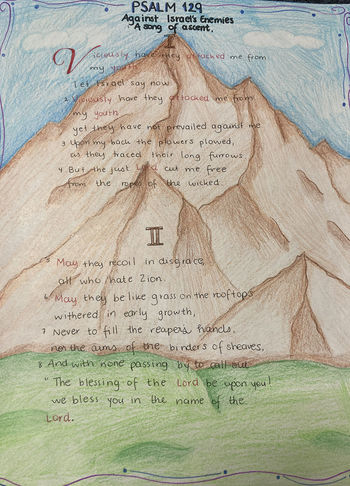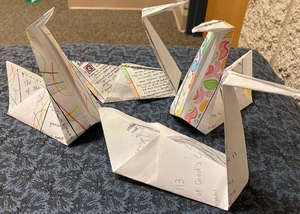During the second meeting of my fall 2020 theology University Seminar, we read and discussed Psalm 120, the first of the 15 Psalms of Ascent. My first-year students sat in front of me, wearing their masks and seated six feet from one another.
“Have you ever felt like a stranger in a foreign land?” I asked.
They all shook their heads in affirmation, and one of them blurted out, “All the time!”

COVID-19 was making their adjustment to their new lives on Notre Dame’s campus difficult; far from home and homesick, they could identify their feelings with those of the biblical exile.
Year by year, the first-year students in my seminar focus especially on the Book of Psalms as the bridge between the Old and the New Testament, a wellspring for the Church’s worship and therapy for the soul. Students are moved by the beauty of the psalms, by the richness of their theology, and by the great range of emotions to which they give expression.
Over the course of the semester, they read and study the psalms themselves, but also commentaries on the Psalter by the Church fathers: Athanasius, Ambrose and Augustine. They discover the practical usefulness of the psalms in the lives of ancient Jews and Christians, as well as in the liturgy today. For many of them, the psalms become a means for personal prayer.
Ten years ago, one class decided by unanimous vote that they wanted to read the entire Book of Psalms aloud in a continuous reading. They coined the word “Psalmathon” for this exercise, which takes approximately five hours to accomplish. The students each assume responsibility for reading or singing a number of psalms, taking turns in 15-minute stints until all 150 psalms had been read.
Over the years the Psalmathon has become an end-of-the-semester tradition. Students invite friends to share in the reading, which takes place in a public space, usually the Great Hall in O’Shaughnessy, on one of the reading days before finals. Passersby often pause in the midst of a busy day to listen to some of the readings. Students listen to their classmates and friends before returning to their studies, spiritually refreshed and nourished, too, by some hot chocolate and cookies.

Another communal exercise that has become a class tradition is the manuscript project of the Psalm Theme Teams. In fall 2020, when the Psalmathon had to be omitted, the Theme Teams proved especially important. The class of 16 students divided into four teams. Each team had a captain, who organized their meetings and led their discussions. The project required them to hand-copy — word by word, line by line — a traditional set of psalms. One team chose the fifteen Psalms of Ascent (Pss. 120–134); the second team, the ten Royal Psalms; the third, the seven Penitential Psalms; the fourth, the twenty Hallelujah Psalms.
Each team decided on a common format to give symbolic expression to the major theme of the respective psalms. Reflecting the pilgrimage motif of the Psalms of Ascent, the students in that group decorated each psalm with marvelous images of mountains. Expressive of the sorrow for sin, the students copied the Penitential Psalms on appropriately somber, brown paper. The students copying the Royal Psalms illuminated their texts with gold crowns and scepters in the margins.
The four students working on the Hallelujah Psalms (Pss. 106, 111–113, 135, and 146–150) chose a surprising format, presenting me on the last day of class with a basket decorated to resemble a nest, in which they had placed folded origami birds, many of them brightly colored. On each bird was written one of the Hallelujah Psalms.

As the students explained, “The image of the bird was chosen because the act of praying the Hallelujah Psalms causes the heart to soar. Like a bird that flies into the sky, one who praises God through these psalms is elevated to take in the wondrous expanse of God’s goodness. Additionally, the process by which the psalms ‘lift up’ the heart is like the unfolding of origami. As one prays a Hallelujah Psalm, each verse evokes praise from the soul.” The verses “unfold the heart, disentangling it from worldly cares and opening it up to the glory of heaven.” Taken together, the Hallelujah Psalms “create a doxology that captures the essence of the entire Psalter.”
The work of my students inspired, in turn, another creative work, a Christmas poem by their teacher. Entitled “Four Calling Birds,” it alludes to a line from the traditional Christmas carol, “The Twelve Days of Christmas;” to the origami birds folded by the four students in the Hallelujah Psalms team: Ian Oh, Charles Stock, Joshua Chun, and Kate Mealey; to all the students in the four Psalm Theme Teams; to the “four living creatures” of the prophet Ezekiel’s vision; and to the four evangelists: Matthew, Mark, Luke, and John.
Thank you, my wonderful students, for a “cool class.”
Four Calling Birds
- Four calling birds
Their basket bright with wings
And colored beaks,
Strange signs, symbolic things,
Red-lettered words.
- Four calling birds
That flutter from the nest
With vibrant song,
Glad messages expressed—
Ecstatic words.
- Four calling birds
Their voices sound a cry
To wake the heart
At singing from the sky,
Angelic words.
- Four calling birds
That twitter, warble, trill,
To jubilate
With shepherds on the hill—
Surpassing words.
- Four calling birds
Alighted on the roof
At Bethlehem
They offer joyous proof
In wingéd words.
- Four calling birds
Announcing prophecies
In Christ fulfilled,
Red-throated melodies,
Inspired words.
- Four calling birds
On Christmas day take flight
With beating wings
To herald wondrous sight,
Incarnate Word.
- Four calling birds
To east and west they fly,
To north and south,
Proclaiming from on high
Exultant words.
- Four calling birds
Matthaeus, man on wing—
Mark too, and Luke,
With John the eagle sing
The Gospel’s Word.
- Four calling birds
High nested on a tree,
A stump that blooms
Its Rose on Calvary,
Eternal Word.
Sister Ann Astell is a Notre Dame professor of theology. A specialist in medieval theology, spirituality and literature, she joined the faculty at Notre Dame in 2007, after teaching for 18 years in the English department at Purdue University. She is the author of six books and the editor of seven volumes, most recently, Saving Fear in Christian Spirituality (2020).